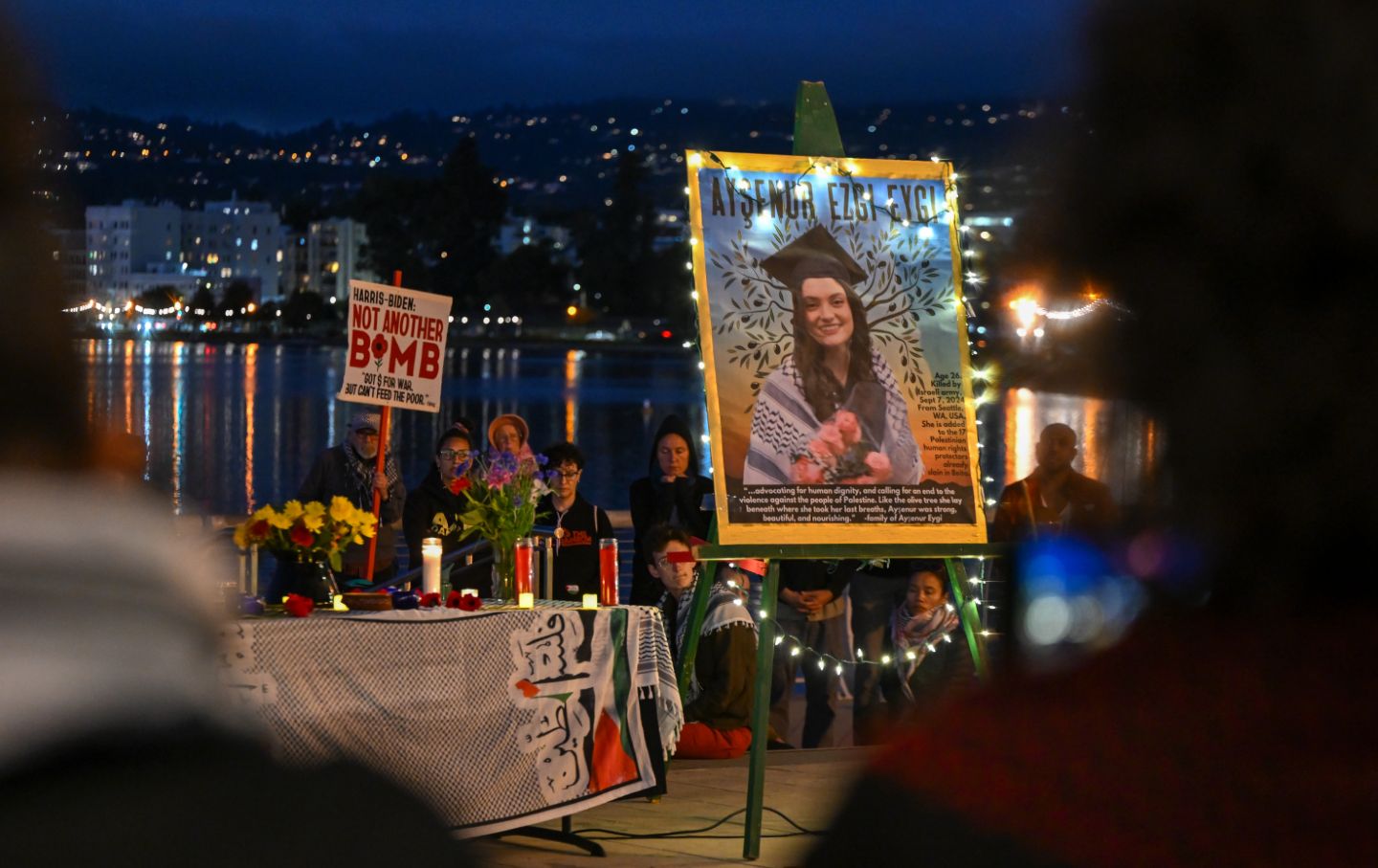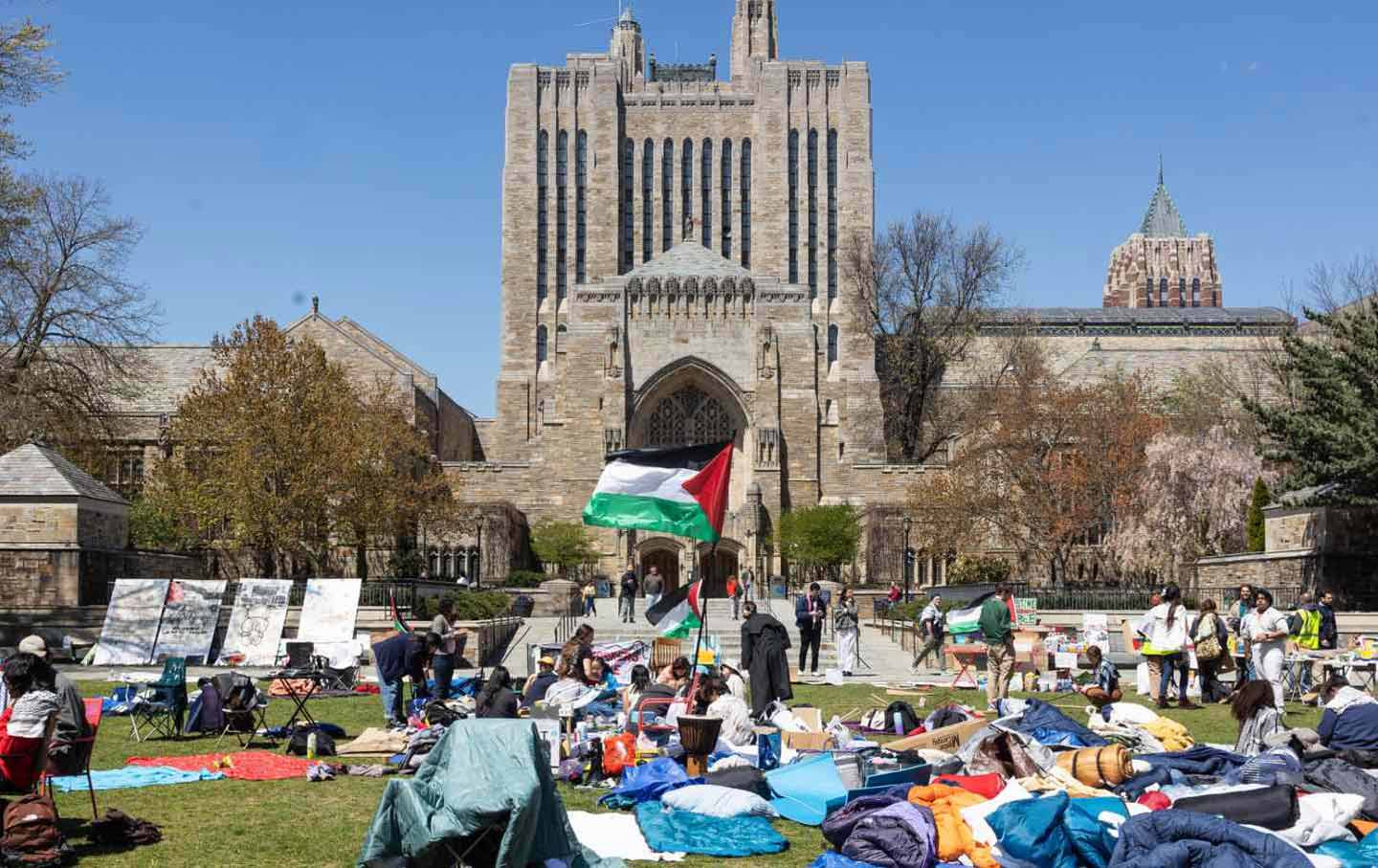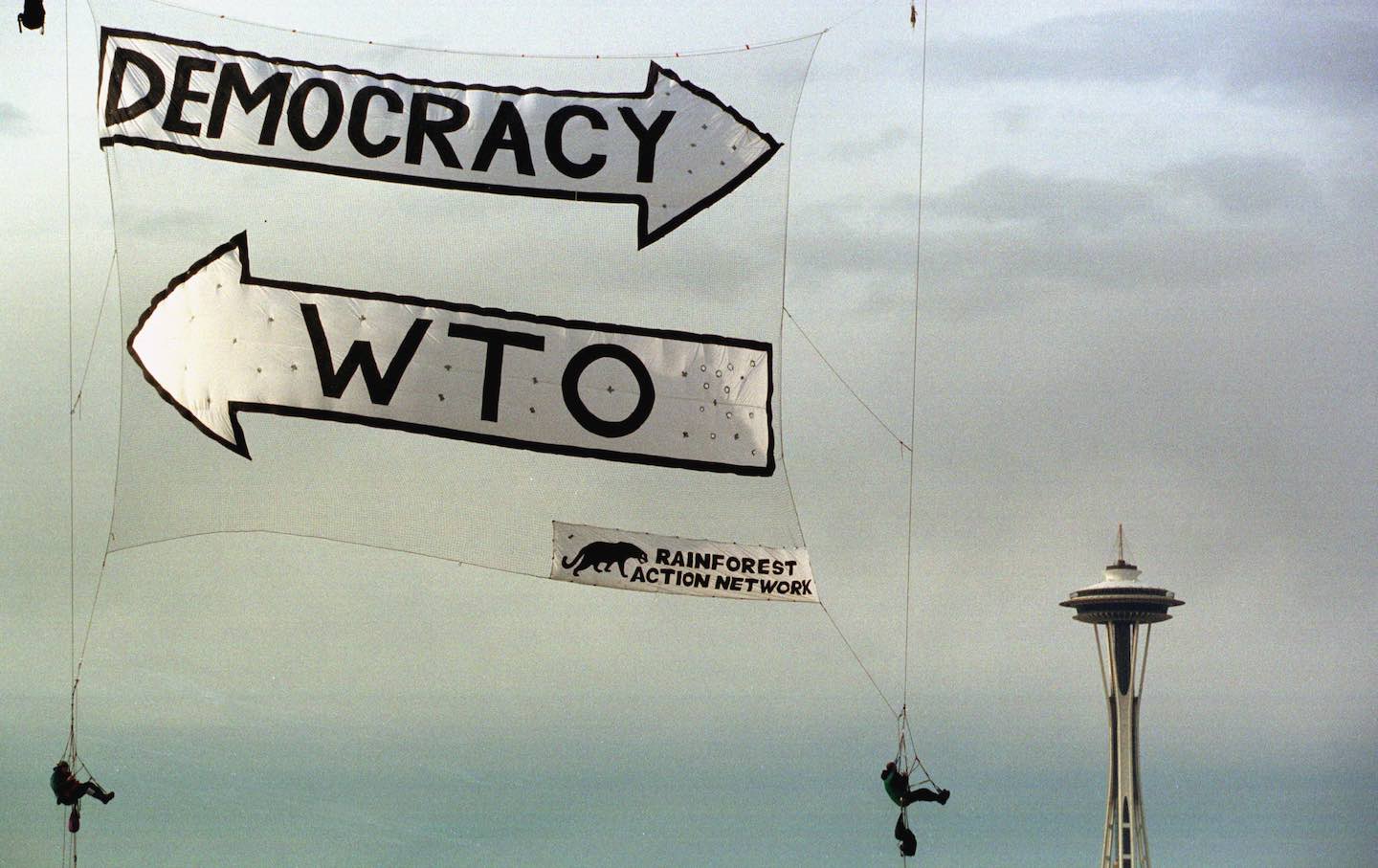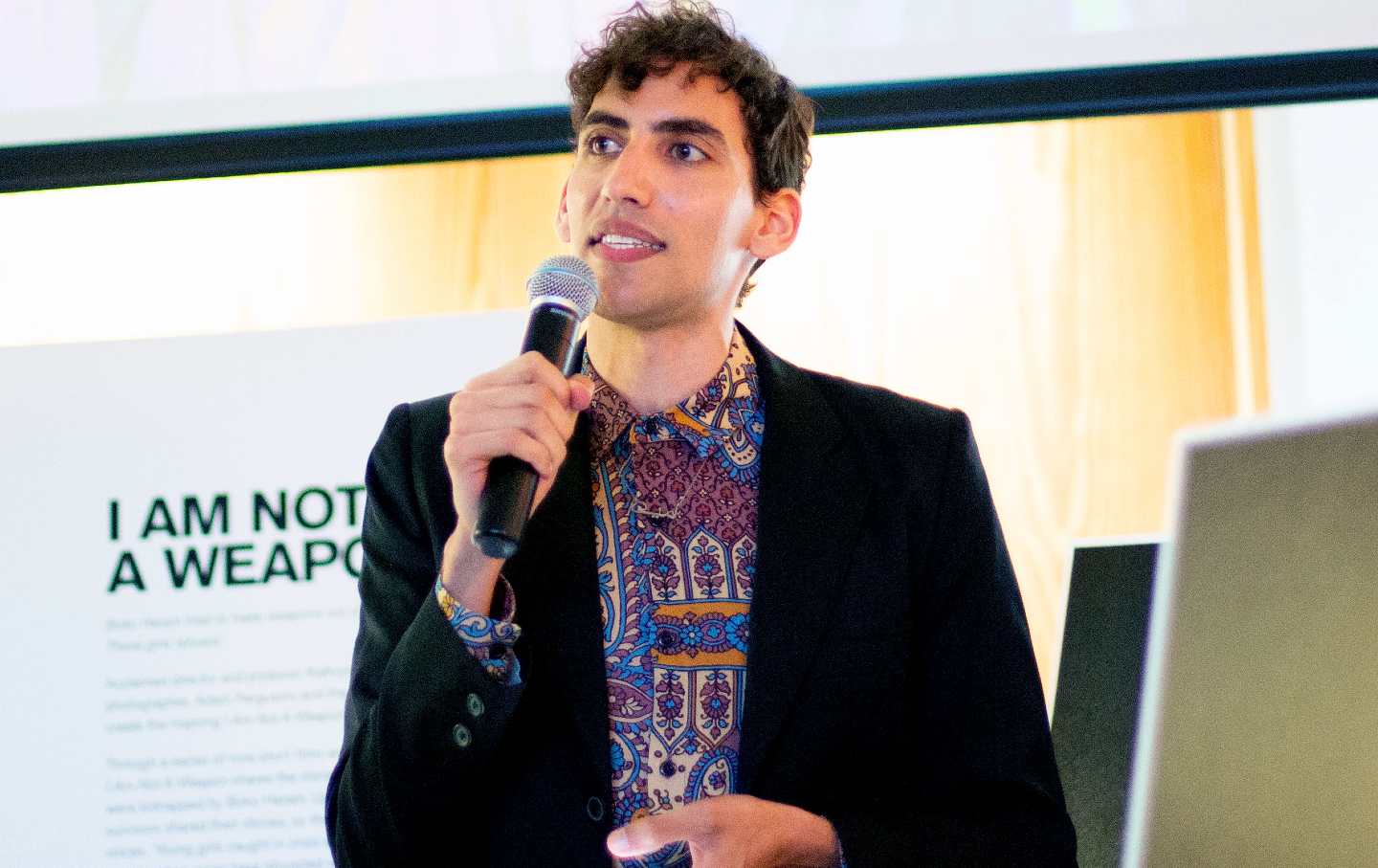Where Is the Outrage Over Israel’s Killing of Aysenur Eygi?
The Biden administration made clear that the murder of an American demands a response—unless that American is killed in the West Bank by the Israel Defense Forces.

Crowds commemorate Aysenur Ezgi Eygi in Oakland, California, on September 9, 2024, after Israeli soldiers shot her in the head in the West Bank as she was standing in solidarity with the Palestinian people.
(Tayfun Coskun / Anadolu via Getty Images)In February, after three US troops were killed in a drone strike in Jordan, President Joe Biden issued a warning. “The United States does not seek conflict in the Middle East or anywhere else in the world. But let all those who might seek to do us harm know this: If you harm an American, we will respond.”
The family of Ayşenur Eygi might beg to differ.
Last week, Eygi, a 26-year-old American citizen, was fatally shot in the head during a demonstration against illegal settlements in the occupied West Bank. Multiple eyewitnesses told reporters that Israeli soldiers assassinated her as she stood in the rear of the protest.
“It was a direct shot to the head, it was not an accident,” one witness told Haaretz. “She was being extra safe out of all of the volunteers, she and her friends were standing the furthest back, in the safest spot that we thought.” Another witness told the paper, “We were visible to the army, just standing around not doing anything. Nothing was happening. I heard two live shots—one hit a metal object and then a Palestinian and injured him in the leg and then one second after I turned and I saw [Eygi] laying unconscious on the ground.”
The murder of an American is no more or less tragic than the murder of any other human being. But American deaths typically receive outsize attention from politicians and the press. In other circumstances, you’d expect the execution of a peaceful American protester to draw outrage from the US president. Yet, as of this writing, Biden has made only the vaguest, factually incoherent comments about Eygi’s killing. Vice President Kamala Harris has said nothing at all. Nor has either of them contacted Eygi’s family. In fact, it took four days for a senior Biden administration official to offer any condemnation of her death.
The United States is not in the habit of allowing other countries to murder its own citizens. But Eygi’s killing appears to have rendered the most powerful country on earth a helpless bystander, willing to outsource its response to Israel.
“Our partners in Israel have indicated that they are conducting a process and that they will make public their findings,” State Department spokesperson Vedant Patel told reporters on Monday, declining to promise that the US would investigate on its own. He also made clear that Israel would get the benefit of the doubt as to what exactly had occurred, despite the fact that Israel has a long history of lying about its soldiers. “Any time an American citizen or civilian loses their life, it is incredibly tragic. But the circumstances around how that happens is important,” he said.
“If you harm an American, we will respond” has morphed into “If you harm an American, we will repeatedly cite another country’s investigation and insinuate that the murder was justified.” The conclusion to draw is clear: The death of an American demands an immediate, forceful response—unless that American is killed by Israelis while protesting on behalf of Palestinian rights.
It’s hardly the first time the United States has engaged in such double standards. In 2022, Israeli snipers assassinated Shireen Abu Akleh, a US citizen working for Al Jazeera in the West Bank, while she was wearing a press vest. Every available piece of evidence suggests that Israeli forces targeted her. The Biden administration essentially ignored her death. No American investigations were launched. Nobody has faced any accountability for the killing. Like Eygi’s, Abu Akleh’s family has never been on the receiving end of one of Biden’s vaunted meditations on grief. Such displays of empathy are apparently reserved only for the right sort of tragedies.
The parallels don’t end there. Back in 2022, Abu Akleh’s relatives were granted a meeting with Secretary of State Antony Blinken—one which they later described as mostly useless. And on Tuesday, Blinken was chosen to respond to Eygi’s death. He was careful to wait until after the Israeli government had released the results of its own supposed inquiry. Israel claimed that that Eygi “was hit indirectly and unintentionally by IDF fire,” and that it had been trying to shoot another protester, who it said had been causing a “riot.”
Popular
“swipe left below to view more authors”Swipe →Multiple reports have refuted the claim that there was any kind of disturbance taking place when Eygi was killed, and “we were actually trying to shoot a different person in the head” is hardly the most compelling excuse. But it was enough for Blinken.
Speaking at a press conference in London, Blinken called Eygi’s killing “unprovoked and unjustified,” adding, “No one, no one should be shot and killed for attending a protest. No one should have to put their life at risk just to purely express their views. The Israeli security forces need to make some fundamental changes in the way they operate in the West Bank, including changes in their rules of engagement.”
This seems like tough talk until you examine it more closely. Egyi’s death was “unprovoked and unjustified”—but it was also deliberate. Blinken’s refusal to say so meant that, far from demanding real accountability, he wound up endorsing the false narrative that her killing was some awful blunder, not an intentional assassination. And the idea that the Biden administration, which has been bankrolling the genocide in Gaza for nearly a year, is going to do anything to force Israel to make the changes Blinken demanded is fanciful.
Later on Tuesday, Biden was asked about Eygi. His response was even worse. “Apparently it was an accident, ricocheted off the ground and just got hit by accident. I’m working that out now,” he told reporters. It would be hard to imagine a more tone-deaf, checked-out answer.
Ayşenur Eygi was, by all accounts, a dedicated organizer, activist, and scholar. Her first name meant “life and light.” And she spent the last moments of that life trying to help oppressed people. In a better world, she would be exalted by her government. Instead, the United States and Israel have collaborated in a tawdry effort to minimize her death.
More from The Nation

Yale Students Voted to Divest, but What’s Next is Unclear Yale Students Voted to Divest, but What’s Next is Unclear
The referendum calls on the school to divest its $41 billion endowment from military weapons manufacturing firms, yet the power to do so is in the hands of the board of trustees.

The “Save Chinatown” Coalition Goes on the Defensive in Philadelphia The “Save Chinatown” Coalition Goes on the Defensive in Philadelphia
The construction of a new basketball arena threatens to fill the neighborhood with more traffic and raise rents.

Human Rights for Everyone Human Rights for Everyone
December 10 is Human Rights Day, commemorating the anniversary of the Universal Declaration of Human Rights (UDHR), one of the world's most groundbreaking global pledges.

25 Years Ago, the Battle of Seattle Showed Us What Democracy Looks Like 25 Years Ago, the Battle of Seattle Showed Us What Democracy Looks Like
The protests against the WTO Conference in 1999 were short-lived. But their legacy has reverberated through American political life ever since.

Hollywood’s Vocal Actors Union Goes Silent on a Gaza Ceasefire Hollywood’s Vocal Actors Union Goes Silent on a Gaza Ceasefire
Amin El Gamal, head of SAG-AFTRA's committee on Middle Eastern and North African members, has advocated for a statement supporting a ceasefire in Gaza—so far without success

The Mirabal Sisters The Mirabal Sisters
Patria, Minerva, and María Teresa Mirabal were sisters from the Dominican Republic who opposed the dictatorship of Rafael Trujillo; they were assassinated on November 25, 1960, und...


